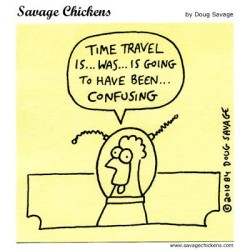 Welcome to Part 4 — the final part — of the series about verb tenses. This post will review some common tense errors. In general we all do pretty well with tenses. However . . .
Welcome to Part 4 — the final part — of the series about verb tenses. This post will review some common tense errors. In general we all do pretty well with tenses. However . . .
Ever hear that present tense usage instead of past tense:
- So I goes to the mall, and I sees my cousin. OR EVEN
- So I go to the mall, and I see my cousin. INSTEAD OF
- So I went to the mall, and I saw my cousin.
Sometimes people mix tenses that refer to the same time:
- So I went to the mall, and I see my cousin there. OR
- So I go to the mall, and I saw my cousin there.
There is a difference between past tense and present perfect:
- I have taken a walk. PROBABLY SHOULD BE
- I took a walk.
- I have taken a walk implies it is repeated action: I have taken a walk every morning this week. (correct)
Past perfect versus simple past causes problems:
- By the time I got home she had made dinner. (correct: two different times — use of past perfect)
- When I got home she made dinner. (correct: same time — two simple pasts)
Future perfect can cause problems too:
- By the time I graduate from high school, I will have been playing piano for twelve years. (yes — future perfect)
- By the time I graduate from high school, I will be playing piano for twelve years (no — plain old perfect)
Ever hear this one? It is kind of colloquial:
- I have known him since I am little. Blech!
- I have known him since I was little. Yes!
Here is a problem with the progressive – present versus present perfect:
- It is snowing for the past two days. Nope.
- It has been snowing for the past two days. Yup.
When we talk about a movie we saw or a book we read, we generally want to use the past tense, since we already saw it or already read it. However, it is correct to use the present tense. You may have read it in the past, but the events in the book haven’t changed:
- This book is about a girl and her brother. They are orphans and are adopted by a big family. Correct.
- This book was about? No, because the book is still about the same thing.
One little quirky thing is the difference between might and may as helping verbs:
- He may have gotten hurt during the hike up the mountain.
- You might have gotten hurt during the hike up the mountain!
Do you see any difference? May in the first sentence implies possibility. You don’t know if he got hurt or not — or even possibly — if he did get hurt — his injury may be due to the hike up the mountain.
Might in the second sentence implies you didn’t get hurt, but whoever said the sentence thought it was a distinct possibility you would. Ah, the little nuances of the English language!
I have been collecting little grammar mistakes that I hear on radio and TV . . . for next week’s post! Meanwhile, If you comment on this week’s post and don’t see it up there for a while, it is because the Grammar Diva is taking a week off and is not taking her passwords with her . . . she thus will not be able to get into any of her websites!



Leave a Reply